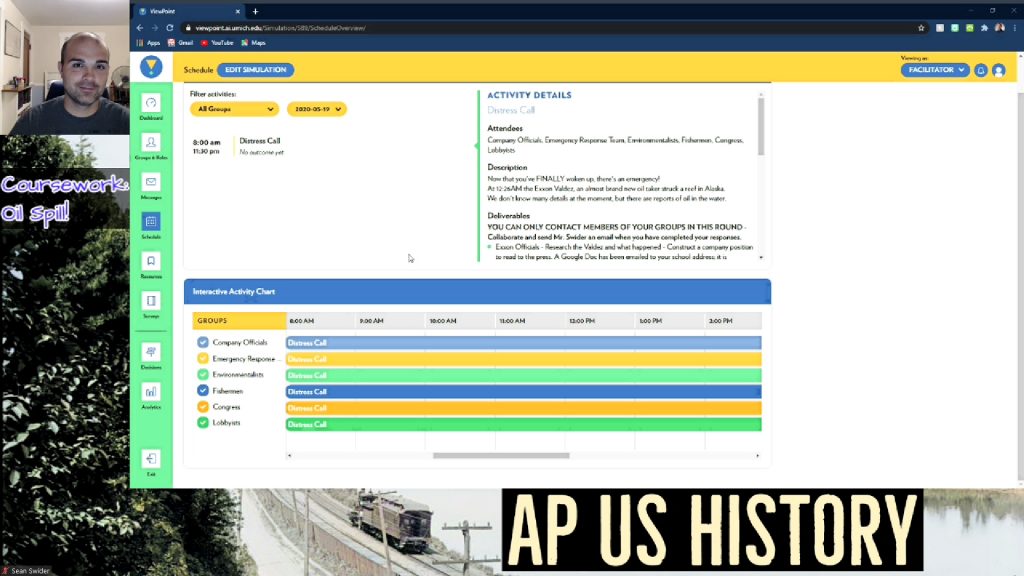As his class moved to remote learning, New York high school teacher uses U-M developed role playing simulation tool to keep students engaged
Parnia Mazhar, Communications Fellow

After Advanced Placement exams finished at Owego Free Academy, Sean Swider knew he had to develop a creative project to keep his advanced history students engaged, especially after a transition to remote learning. Swider then discovered the role-playing simulation tool ViewPoint and decided to simulate an oil spill disaster.
Modeled after the 1989 Exxon Valdez spill in Prince William Sound, Alaska, Swider created the simulation so his students could practice leadership roles and understand the power of the U.S. democratic process.
“With this simulation, I was really trying to help the students become more comfortable in the democratic process and realizing that they might not be an elected official, but they’ve got a voice in what our laws become,” Swider said. “And that’s so much easier than trying to change the law after it already exists.”
To facilitate the project, the New York-based high school teacher used ViewPoint, developed by the Center for Academic Innovation in collaboration with Liz Gerber, the Jack L. Walker, Jr. Professor of Public Policy at the University of Michigan. The tool allows users to build customized simulations with participants playing roles to learn problem-solving, collaboration, empathy, and communication skills.
How ViewPoint Works
ViewPoint is a cloud-based simulation tool where participants are assigned roles in a scenario and can be organized into groups. Participants are given information about who their character is and what their priorities are, and can also see this information about other characters in the simulation. Participants may also be assigned privately held beliefs for their character that only they know. These personal motivations make the characters and simulations more dynamic and complex. The ViewPoint platform also provides advanced scheduling and messaging features, and a resource hub to maximize communication and collaboration.
Learn More | Visit Our ViewPoint Website
Facilitators can monitor all participant activity, schedule events and upload resources for participants to use. ViewPoint also allows facilitators to make updates in real-time to make their simulations more dynamic, realistic, and complex.
ViewPoint can support many types of scenarios and has been used by universities including the University of Michigan, Stanford University, Ball State University, and Boston College. Swider said the tool was just as valuable for his high school students.
Creating The Oil Spill Act — A Real-Time Play
For his simulation, Swider divided students into six different roles: Exxon company officials, an emergency response team, environmentalists, the fishing industry, Congress, and lobbyists. Students worked within these groups to come up with a response to the oil spill based on their group’s priorities and policies. They then drafted legislation and completed their own Oil Spill Act.
“I felt like I was half writing a play when I did this because I was trying to write all these different roles that the students were going to have, and I didn’t want too many restraints on them,” Swider said, adding that ViewPoint allowed flexibility in real-time as the groups needed to react to several unique challenges.
One of Swider’s favorite features of ViewPoint was the ability for each group to have what are called Private Beliefs that can only be seen by the facilitator and the participants in the group. The Private Beliefs feature helps participants understand their character’s private motives to more realistically play their role.
“They had to figure out the politics of how to interact with one another as stakeholders in this event,” Swider said of the Private Beliefs feature. “It was like a secondary set of directions that I used to really individualize each of the roles.”
In one instance, Swider said the Private Beliefs feature allowed realistic tension to build between the emergency response team and Congress, a plausible real-world scenario. Ultimately, this feature allowed Swider and his students to replicate the groups’ roles and interactions as realistically as possible.
Updating and Adjusting Mid-Simulation
ViewPoint also allows facilitators to preschedule many aspects of the simulation. They can release updates and information mid-simulation, rather than releasing everything at the beginning. The delayed release of information prevented information overload and allowed students to get more comfortable in the simulation as it went along, Swider said.
In the middle of the simulation, Swider said he realized he needed to adjust his original timeline. He said he liked that ViewPoint allowed him to easily go back and make edits to the simulation whenever necessary, which would be much more complicated if he were using traditional classroom materials.
“If I was in the classroom and I had given out a bunch of handouts and papers to students, it would have been kind of messy because all the students would have been like, ‘Well, but I’ve got this handout,’ and then they lose the other handout,” Swider said. “So it was nice to keep everything organized in ViewPoint.”
Swider said he would definitely use ViewPoint for future simulations, especially because it forced him to increase his knowledge of the topic in order to build the simulation, and that information fed the knowledge of his students as well.
“One of the side effects of using ViewPoint is that it pushed me to be a better teacher in the sense that I had to really know all the details about this subject,” Swider said. “It helped me out quite a bit.”

Negotiating, Drafting and Passing The Oil Spill Act of 1990
At the conclusion of the simulation, students created their own “Oil Spill Act of 1990,” a six-page piece of legislation filled with concrete solutions.
According to the document, the purpose of the act was to “establish limitations on liability for damages resulting from oil pollution, to establish a fund for the payment of compensation for such damages, and for other purposes.”
ViewPoint helped students collaborate and negotiate with one another to develop this act and find solutions that benefitted each of their groups, according to Swider. He said he enjoyed how the program allowed him to monitor the messages students sent to one another so he could see how they were collaborating throughout the simulation.
“One of the strongest aspects of ViewPoint is that it’s geared towards having students work together,” Swider said. “And then I can sit back, watch it, and guide them. It allows me the space to facilitate where they may be getting stuck.”
Swider thanked his school district for their support and ideas, and for helping the process run as smoothly as it did.
“[The teachers] all got really excited about the simulation as well,” Swider said. “So maybe some of them will be curious enough to use more simulations or even use ViewPoint in the future.”


